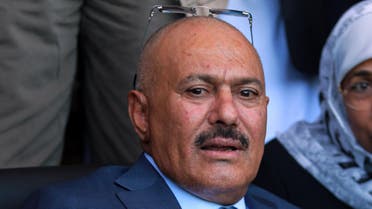Saleh’s party quits Yemen cabinet after sanctions
President Hadi’s cabinet faces major setback after Saleh’s party quits and Houthis demand reshuffle
Yemen’s recently named cabinet headed by President Abd-Rabbu Mansour Hadi was on the verge of collapse Saturday after Shiite Houthi rebels demanded a reshuffle and former President Ali Abdullah Saleh’s party withdrew its support from the Cabinet.
The opposition to Hadi’s government came after Saleh and two senior Houthi rebels were blacklisted on Friday by the U.N. Security Council for their role in Yemen’s unrest, threatening peace and stability in the country’s transition after an Arab Spring-inspired uprising.
The U.S.-sponsored sanctions include a visa ban and asset freezing of the blacklisted individuals.
Saleh is suspected to have helped the Houthi rebels take the capital, Sanaa, and extend their control over major parts of the country.
Yemen, a U.S. ally that borders oil-producer Saudi Arabia, is trying to end political unrest that began with mass protests against Saleh, president for 33 years until he stepped down in 2012.
“As of fall 2012 Ali Abdullah Saleh had reportedly become one of the primary supporters of the Houthi rebellion. Saleh was behind the attempts to cause chaos throughout Yemen,” the United States said in a “statement of case” obtained by Reuters.
Saleh, who has denied seeking to destabilize Yemen, rejected on Saturday the sanctions in an address to his General People’s Congress.
The GPC, Saleh’s party, warned on Thursday that any sanctions on the former president or “would have negative consequences on the political process.”
On Saturday the party said it was not consulted in forming the long-awaited cabinet and urged party nominees to turn down their assigned ministries.
Earlier the GPC’s central committee dismissed Hadi from his posts as vice president and secretary-general of the party, accusing him of soliciting the U.N. sanctions.
The Houthis, who demand a bigger say for the country’s Zaydi Shiite Muslim sect and controls Yemen’s most powerful militia, said Hadi’s choice of cabinet ministers “dashed hopes and did not abide by what was agreed upon.”
Hadi was forced to name a new government as part of a U.N.-brokered deal following the Houthis’ entry into Sanaa on Sept. 21 after defeating rival political factions in battle.
A report published by Al Arabiya News last month revealed how Saleh was “actively helping the Houthi rebels take over the country as part of his plan to return to power.”
The report gave details of a "secret" meeting between Saleh and Houthi leaders in which both parties set up plans to convince regional powers, especially Saudi Arabia, about the events in Yemen.
The Houthis reportedly asked Saleh to assign some of his aides well-known to Riyadh “to try to deceive the Saudi leadership into believing that developments in Yemen were under control and that the Houthis can be removed from power if the kingdom entrusts him [Saleh] with this role.”
The objective of this plot, according to the report, is to “shake confidence among Houthi opponents –who might be backed by Saudi Arabia – in order to create a situation that is mutually beneficial for both Saleh and the Houthis.”
Read the full report here:
Eyeing return, Yemen’s ousted Saleh aids Houthis
(With Agencies)
-

Saleh’s party quits Yemen cabinet after sanctions
President Hadi’s cabinet faces major setback after Saleh’s party quits and Houthis ... Middle East -

Backers of Yemen’s Saleh protest against U.S.
Saleh and two key Houthi rebel leaders face U.N. sanctions for suspected role in ... Middle East -

2000GMT: Yemen’s Saleh threatens escalation if he is targeted with sanctions
News Bulletins -

2000GMT: U.S. denies pressing Saleh to leave Yemen
News Bulletins -

1300GMT: Yemen: Saleh, Washington exchange accusations over sanctions
News Bulletins -

Eyeing return, Yemen’s ousted Saleh aids Houthis
Ali Abdullah Saleh is believed to be working with the Houthi rebels on a plot to ... Analysis -

U.S. denies pressing Saleh to leave Yemen
Saleh’s party, the General People’s Congress, said the ex-leader, received an ... Middle East -

U.N. poised to slap sanctions on former Yemen strongman
A U.S.-drafted proposal to the U.N. council would slap a visa ban and an assets ... Middle East
